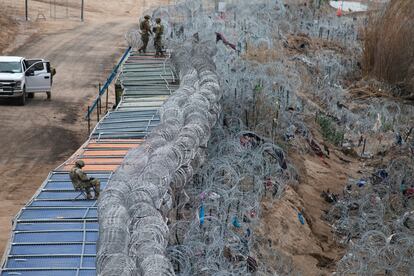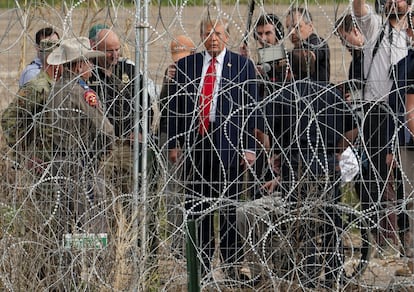SB4, the Texas anti-immigrant law causing even more chaos on the US-Mexico border
Despite being temporarily blocked by the courts, the state legislation is already causing uncertainty among migrants and the local authorities who will be tasked with enforcing it


Even without having come into force, the Texas anti-immigrant law has left more uncertainty in the already unstable U.S.-Mexico border. A lone Mexican National Guard soldier sat Thursday in the shade of a tree facing the river that separates the two countries. “There they take it seriously,” said the agent, who did not reveal his name for fear of reprisals, in reference to the U.S. side of the border. “Here it seems like they don’t care at all. They don’t even put up a little fence for us,” he added. On the opposite bank, at Eagle Pass, hundreds of miles of barbed wire form a thick metal undergrowth that protects a wall made of stacked containers. Law enforcement officers, armed to the teeth, monitor the river from above. Behind them is a municipal field. The American dream begins on a golf course.
“The order we have is to detain the migrants,” said the guard. “Sometimes we don’t reach them because in two seconds they’ve jumped into the water.” At noon, the Rio Grande is quiet. It’s hard to believe that so many lives have ended there. A white cross buried in the wetland seems to want to alert skeptics to the danger. It is marked with the name of Jesús Rubén de León Escamilla, who drowned in August of last year.
Crossings into the United States are made when the sun begins to rise. “They look and look for a gap through the barbed wire until they find it somewhere,” says the soldier, who has been stationed in Ciudad Acuña, in the Mexican state of Coahuila, for 24 years, and has been guarding the Piedras Negras crossing, some 62 miles southeast of his base, since January. This has become one of the epicenters of the U.S. immigration crisis, fueled by the tensions between Texas’ Republican government and the Democratic administration headed by Joe Biden.
Texas has around 1,240 miles of border with Mexico, more than half of the entire U.S.-Mexico border. To stop the migratory wave, the state government has built a wall of containers and placed miles of barbed wire and buoys over the river. But it intends to go further: Texas authorities want to create a huge legal barrier with one of the toughest anti-immigrant laws in the country in more than a decade. Texas Governor Greg Abbott signed the law, known as Senate Bill 4 (SB4), in December. It should have come into effect on March 5, but it was blocked by a legal offensive from social organizations and the Biden administration.
Under the law, illegal entry into Texas from Mexico is an offense that is punishable by six months in prison. The penalty is toughened for repeat offenders, who could be sentenced to between two and 20 years in prison. The legislation allows local security agencies to request papers from migrants and make arrests practically anywhere, with the exception of schools, churches, hospitals and health centers. Documents can be requested in any Texas county, even hundreds of miles from the border. Congressman David Spiller, one of the authors of the law, believes that 95% of arrests will be made no further than 50 miles from the river.

The most controversial aspect of the law is that it implements a system where detainees are brought before state judges, who initiate a deportation process to Mexico regardless of whether they are Mexican citizens or citizens of other countries. The Mexican government has rejected the rule, arguing last week that it will not accept any repatriates sent by the Texas authorities.
A federal judge stopped the rule from coming into force at the beginning of March, arguing that it violates federal laws. The judge said that the executive branch maintains “complete discretion” over who should be deported. Texas appealed the decision, and the case was brought to the federal Fifth Circuit of Appeals. This was despite the fact that the Supreme Court allowed the law to be in force for a few hours in a procedural tug-of-war.
The first hearings were held this past week before the appeals panel, located in New Orleans. “This is the first time, it seems to me, that a state has claimed that they have the right to remove illegal aliens. I mean, this is not a power that historically has been exercised by states, has it?” Judge Priscilla Richman questioned Texas lawyer Aaron Nielson. He replied that Texas has the right to defend itself and arrest people who violate the rules in their state. “Texas has decided that we are at the epicenter of this crisis. We are on the front line. And we are going to do something about it,” said Nielson.
During the hearing, the panel of the Fifth Circuit wanted to know how Texas would deal with an illegal immigrant who arrives in Texas from another state or from Canada. “I confess, you honor, I don’t know,” Nielson admitted. Judge Richman also noted that nowhere in the law does it stipulate that police officers must hand over detained migrants to federal immigration authorities. Only one of the judges on the panel was in favor of letting the law go into effect: Judge Andrew Oldham, a Donald Trump appointee. The next hearing will take place on April 2.
The law seems destined to reach the Supreme Court, where it will be reviewed by the conservative majority that Trump formed while in government. “I believe that under no circumstances will the court allow Texas to deport people, so it seems to me that it will be overruled. It seems impossible even for this court,” said Marshall Fritz, the Immigration Director of the Emerson Collective, a progressive philanthropic organization. However, the expert believes that the right-wing justices may allow Texas authorities to file charges against undocumented immigrants. “Five years ago it would not even have been possible to imagine, but today it is a feasible question,” he added.

The law has not even provided certainty to its supporters. “It is unlikely that observers will see an overnight change,” said Brad Coe, the sheriff of the border county of Kinney, which has about 12 miles of border with Mexico. “Like anything else, officers and deputies will need probable cause before proceeding,” said the head of the small police force, made up of 13 people. Texas has 31 counties on the border. The police forces of these regions support SB4, but have little interest in their organizations adding immigration control to their daily tasks when Customs and Border Patrol operates in the area.
“This has been a roller coaster of emotions,” said Araceli Martínez, from the Camino a Casa shelter, in Piedras Negras in Mexico. The site has space for 20 minors, 10 men and 10 women. Only two, of Venezuelan nationality, have the possibility of reaching the United States in the coming months. The rest will be repatriated to their countries of origin. Many migrants come to this city because, in their journey north, they hear that it is a safer place to cross into the U.S. compared to other border cities. But from the outside, the shelter looks like a prison painted in bright colors. It has high walls crowned with concertina wire and large bars. Martínez says that people smugglers, known as polleros, have tried to enter to take away minors. “The kids are money to them,” she said.
News of the Texas law has reached this city. In another migrant shelter in the center, Honduran Víctor Najar, 22, says he prefers to wait a bit for the waters to calm down before continuing his trip north. He has been in Mexico since February and says that some uncles are waiting for him in North Carolina. “I want to cross, but I don’t want to end up in prison,” he said. Najar — originally from the Choluteca area — has started the procedure to request asylum in the United States, but the process is taking a long time, and he is already “itching” to be on the other side to start a new life. For now, the Texas authorities have achieved their goal. Victor has hit the legal wall out of pure fear.
Sign up for our weekly newsletter to get more English-language news coverage from EL PAÍS USA Edition
Tu suscripción se está usando en otro dispositivo
¿Quieres añadir otro usuario a tu suscripción?
Si continúas leyendo en este dispositivo, no se podrá leer en el otro.
FlechaTu suscripción se está usando en otro dispositivo y solo puedes acceder a EL PAÍS desde un dispositivo a la vez.
Si quieres compartir tu cuenta, cambia tu suscripción a la modalidad Premium, así podrás añadir otro usuario. Cada uno accederá con su propia cuenta de email, lo que os permitirá personalizar vuestra experiencia en EL PAÍS.
¿Tienes una suscripción de empresa? Accede aquí para contratar más cuentas.
En el caso de no saber quién está usando tu cuenta, te recomendamos cambiar tu contraseña aquí.
Si decides continuar compartiendo tu cuenta, este mensaje se mostrará en tu dispositivo y en el de la otra persona que está usando tu cuenta de forma indefinida, afectando a tu experiencia de lectura. Puedes consultar aquí los términos y condiciones de la suscripción digital.








































